Obada Kojan
Mohammad Nawaf, a doctor residing in Idlib’s rural outskirts, is trying to legally register his marriage in the city of Hama three years after the wedding, during which time his wife gave birth to their son Abdul Karim – just like his friend Hassan, a journalist living in Istanbul, who registered his marriage at a total cost exceeding 300 US dollars.
Mohammad and Hassan have something else in common – they are both banned from entering Hama due to their opposition to the al-Assad regime, which controls the city. However, they both agree that it is essential to register their marriage in the city, not out of love for the state administration, bureaucracy or entrenched corruption, but because they know that this is the only way their marriage will be legal.
The Interim Government’s legal office has been unable to find a solution for young Syrians seeking to get married in their countries of refuge and the Sharia courts in the liberated areas have failed to provide a legal alternative to the regime’s courts and administration. Out of thousands of new couples married during the revolution years, some have managed to document their marriages while others still rely on the “sheikh’s paper” (license), which is valid under Sharia law.
The Land of Sharia Courts Without Legal Coverage
Hala and her husband turned a blind eye to the complications of their civil status and made do with the “sheikh’s contract” as a religious document proving their marriage. Despite the escalating bombing of their city Idlib (which has recently been liberated), they lived blissfully and securely for several months, delighted by the birth of their child – until Hala became a widow overnight when a barrel bomb was dropped on their house.
Hala, 19, lives with her baby in her parent’s house, a permanent look of despair on her face caused by her tragic loss and from thinking about her fate and that of her child. There is no legal document proving the marriage and birth, so she has no rights as a widow according to official records and there is no record of her son.
The young woman ponders her options while speaking to Enab Baladi, “I do not know what to do, do I try to enter the regime areas to register my marriage? Or do I resort to the Sharia court here?” Hala will not be able to register her marriage and her son’s birth with the regime, especially after the death of her husband. She may be forced to accept a document issued by a local Sharia court that is not legally recognized, which may even prevent her from leaving the liberated areas.
Tarek faces a similar situation. He has been married for about a year and works as a reporter in Idlib’s rural outskirts. He preferred to rely on the “sheikh’s contract” without going through the process of registering it since the general view in the liberated areas is, “The essential procedure for marriage is the sheikh’s contract and publicizing the marriage”. This is according to Sharia law but legally speaking, residents can only obtain documents that can be used locally in the liberated areas but do not enjoy Syrian or international legal recognition. These documents are only useful for receiving aid, for the purpose of population surveys and daily needs.
Doctor Mohammad Nawaf, who works in the medical and human rights fields, appeared more aware of the negative consequences of not registering his marriage. It means that he will certainly not be able to obtain a legal document for his two year-old child such as a civil record or passport, which may help the family if they get the opportunity to seek refuge in another country.
Nawaf plans to contact a lawyer in his home city, which he was forced to leave, to help him register the Sharia marriage deed and register his child in the Census Directorate to ensure he will be able to obtain any legal document in the future. The cost of the process will come to more than 300 US dollars (160,000 Syrian pounds), most of which will be paid in bribes to justice officials in the regime’s bureaucracy. in Turkey and Registration with the Regime
Perhaps the details of registering the marriage did not occur to the journalist Hassan’s mind at the time of his wedding as he was busy dealing with the difficulties of being a refugee in Istanbul, far from his family who fled to Saudi Arabia three years ago. He went ahead with the marriage, making use of a Syrian sheikh to write his marriage contract. In the presence of witnesses – new friends in exile – the couple happily signed the paper with the blessings of his family via Skype.
Three seasons have passed since the journalist’s wedding. He now lives with his pregnant wife in relative stability despite the legal constraints on their residency and the difficulties of exile. The anticipated arrival of their first child provided an incentive to register the marriage in the same way his friend, Mohammad Nawaf, had via a lawyer he knows in the city of Hama.
Hassan’s marriage contract is now ready after passing through the Sharia court, the civil court and the civil registry. All that is missing is ratification by the Ministry of Foreign Affairs to make it an official document, which he will use to obtain a passport and register his newborn child. It is a step tens of young Syrians in Turkey have resorted to, according to Enab Baladi’s observations, and it is what prompted the journalist to recommend his doctor friend to follow his example.
Syrians in Turkey have resorted to registering their marriages with the Turkish government to obtain a “family booklet” similar to that held by Turkish citizens, which facilitates access to medical and humanitarian services for those seeking it. The document is only legally recognized in Turkey and does not give a newborn child or his parents documents to travel outside the country.
Legalizing Contracts in the Regime Administration is Legitimate and Necessary
The courts, bodies and offices belonging to the various opposition groups have failed to fill this legal and social loophole. Some Sharia bodies have even obstructed the work of courts specialized in civil matters in the liberated areas, leading to their complete shut-down.
Enab Baladi obtained special information that shows that the “Islamic Institution” in Idlib harassed a judge in a court in the town of Maarret Misrin, which was working to document marriages, deaths and civil matters and register them legally with the Syrian regime administration. Due to this harassment, the court was closed down completely around two months ago, while the civil registry office in the town of al-Dana legally documents births and deaths only for residents of that area.
We directed a question to the judge Ibrahim Hussein, a member of the Syrian Independent Judicial Council, regarding Syrians’ desire to register their marriages in the regime administration. He explained, “The documents issued by the Sharia court or any opposition institution are not legally recognized, locally or internationally. If the documents issued by the Sharia courts or the Ministry of Justice in the Interim Government were recognized, people would turn to it”. He stressed, “It is residents’ right to register… It is their duty in order to ensure the rights of husbands, wives and children.”
Abdul Naser Hawashani, a lawyer and human rights activist, shared the judge’s opinion regarding the legality of regime documents. He argued residents were justified in turning to the regime, “Citizens are not convinced by the Sharia courts, because of their multiple legal frameworks and their lack of representation of the liberated areas in contrast to the regime’s courts and its administration, which are considered part of the state. This is what we lack in our liberated areas”. He blamed the international community “and its lack of willingness to deny the regime legitimacy by stripping it of its appearance of sovereignty.”
“We register in the Syrian state courts, there is no harm in it. Those opposing al-Assad have some wrong conceptions of state institutions and Syrians’ ownership of them,” according to the lawyer G.K. who has processed tens of marriage contracts for Syrians in areas outside the regime’s control. He called on everyone to register their marriage legally and denied that he, or others like him, has a “financial interest” in the matter. “We do the process for a symbolic fee… We pay the officials to cast a blind eye to the contracts”.
The issue of unregistered marriages in Syria and in countries of refuge has led to the birth of children of unknown lineage after the death of their fathers due to the circumstances of the complex war. This is what the First Sharia Judge in Damascus warned of in various media reports, borne out by statistics from the Directorate for Immigration and Passports estimating that around 37,000 births took place between 2011 and 2015 in countries of refuge. All of those children have no documents proving they are Syrian citizens.
if you think the article contain wrong information or you have additional details Send Correction
النسخة العربية من المقال
-
Follow us :
Most viewed
- Al-Sharaa and Abdi reach agreement on merger of SDF into Syrian state
- Turkey confirms continuation of its operations in northeastern Syria
- Syrian Defense Ministry appoints "Abu Amsha" as Hama Brigade commander
- Governor of As-Suwayda signs understanding agreement with al-Hijri: Key details unveiled
- No financial flows to Syria despite partial lifting of sanctions











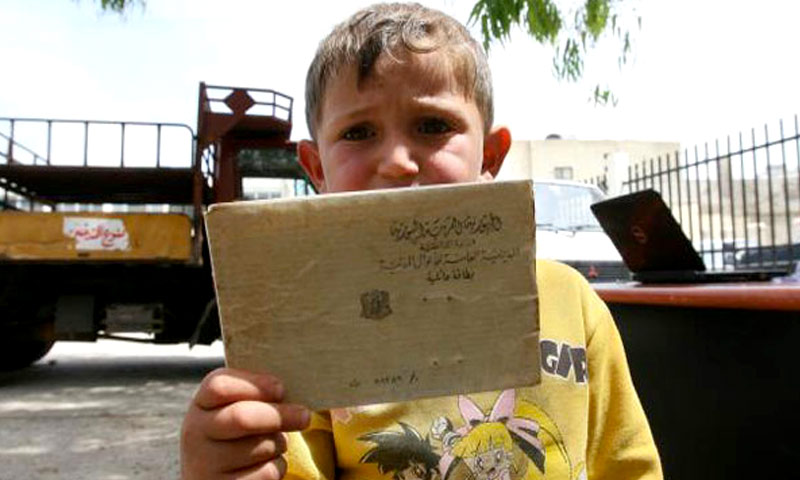






 A
A
A
A
A
A



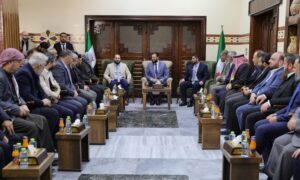

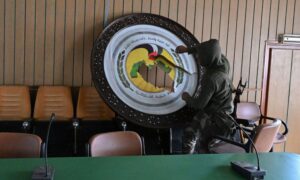
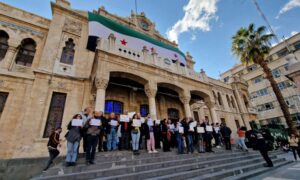
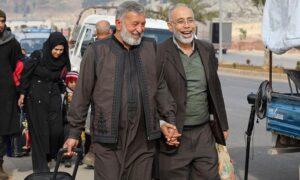
 More In-Depth
More In-Depth